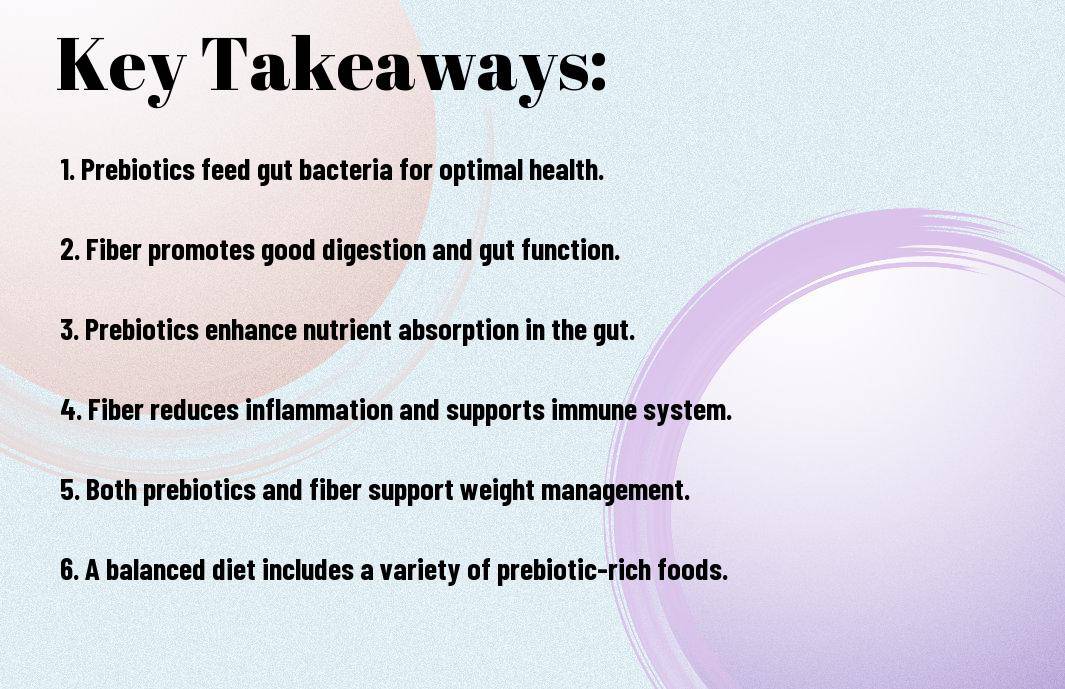
Newsletter Subscribe
Enter your email address below and subscribe to our newsletter

Enter your email address below and subscribe to our newsletter

Gut health is crucial for overall well-being, and prebiotics and fiber play a significant role in maintaining a healthy gut. In this blog post, I will probe into the importance of these two necessary components for your digestive system. Understanding how prebiotics and fiber work in your gut can lead to improved digestion, better nutrient absorption, and a stronger immune system. Let’s explore the vital connection between prebiotics, fiber, and your gut health.


An integral component of gut health is the diverse community of microorganisms that reside in our digestive tract. These gut bacteria play a critical role in various functions such as digestion, immune system modulation, and even mental health. Ensuring a healthy balance of gut bacteria is vital for overall well-being.
The gut microbiome is home to both beneficial and harmful bacteria. Maintaining an equilibrium between the two is crucial for optimal gut health. While good bacteria support digestion and nutrient absorption, bad bacteria can cause inflammation and digestive issues if they overpower the beneficial microbes.
To promote a healthy balance of good and bad bacteria in the gut, it is important to consume a diet rich in prebiotics and fiber. These nutrients serve as fuel for the good bacteria, helping them thrive and keeping the harmful bacteria in check. By prioritizing a diet that supports a diverse and balanced gut microbiome, you can optimize your overall health and well-being.

If you’ve ever wondered, Are Prebiotics Important for Gut Health?, the answer is a resounding yes! Prebiotics are crucial for nurturing the good bacteria in your gut and promoting overall digestive health.
One of the key components in maintaining a healthy gut microbiome is **prebiotics**. These are non-digestible fibers that serve as food for the beneficial bacteria in your digestive system. By consuming prebiotics, you can help these friendly bacteria thrive and improve your gut health.
Any **prebiotics** are crucial for your gut health, but some of the most common types include **inulin**, **fructooligosaccharides (FOS)**, **galactooligosaccharides (GOS)**, and **lactulose**. These prebiotics can be found naturally in various foods or taken as supplements. Perceiving the diverse sources of prebiotics can help you incorporate a wide range of these beneficial fibers into your diet.
| Inulin | Fructooligosaccharides (FOS) |
| Galactooligosaccharides (GOS) | Lactulose |
Prebiotics play a crucial role in **supporting a healthy gut** by nourishing the beneficial bacteria that reside in your digestive system. With adequate intake of prebiotics, you can **improve digestion**, **enhance nutrient absorption**, and even **boost your immune system**. Including a variety of prebiotic-rich foods in your daily diet can significantly benefit your gut health and overall well-being.
Fructooligosaccharides, commonly known as FOS, are a type of prebiotic that offer numerous benefits for your gut health. **FOS** can help **increase the population of good bacteria**, **reduce inflammation in the gut**, and **improve bowel regularity**. By including FOS-rich foods like bananas, onions, and garlic in your diet, you can actively support the health of your gut microbiome.

After all, fiber plays a crucial role in digestion by adding bulk to your stool, which helps food move through your digestive system more efficiently. This not only prevents constipation but also supports regular bowel movements, promoting overall gut health.
One key difference between soluble and insoluble fiber lies in how they interact with water. Soluble fiber dissolves in water to form a gel-like consistency, while insoluble fiber does not dissolve and remains intact as it moves through your digestive tract.
Health: Soluble fiber has been linked to lower cholesterol levels and improved blood sugar control, while insoluble fiber adds bulk to your stool, aiding in digestive regularity and preventing constipation.
For a healthy gut microbiome, incorporating fiber-rich foods into your diet is crucial. Fiber acts as a prebiotic, providing fuel for the beneficial bacteria in your gut. By nourishing these good bacteria, fiber helps maintain a balanced and diverse gut microbiota, which is crucial for overall gut health.
For instance, foods like onions, garlic, bananas, and oats are great sources of prebiotic fiber that can help support the growth of beneficial bacteria in your gut, promoting a healthy balance of microorganisms.
Fiber is vital for a healthy gut and plays a crucial role in boosting your immune system. By feeding the good bacteria in your gut, prebiotics help maintain a balance of beneficial microorganisms, which in turn supports a strong immune response.
Immune responses in the gut can lead to chronic inflammation, which is linked to various health issues. Prebiotics and fiber help reduce inflammation by promoting a healthy gut microbiome, which can in turn alleviate inflammation throughout the body.
With a diet rich in prebiotics and fiber, you can significantly improve your digestion and reduce symptoms of IBS. Prebiotics help nourish the beneficial bacteria in your gut, which can alleviate bloating, gas, and other discomfort associated with IBS.
For many years, the Western diet has been moving away from fiber-rich foods, leading to a rise in modern diseases such as obesity, type 2 diabetes, cardiovascular diseases, and some types of cancer. This shift in dietary habits has had a significant impact on our overall health and well-being.
On a low-fiber diet, the lack of prebiotics starves the beneficial gut bacteria, leading to an imbalance in the gut microbiota. This imbalance can weaken the immune system, increase inflammation, and pave the way for various health issues ranging from digestive problems to mental health disorders.
LowFiber: Research has shown that a low-fiber diet can alter the composition of gut bacteria, reducing the diversity of microorganisms that play a crucial role in maintaining gut health. This disruption can have far-reaching consequences for overall health.
An crucial step in improving gut health and overall well-being is to reverse the trend of consuming low-fiber diets. By reintroducing fiber-rich foods and incorporating prebiotics into your meals, you can nourish the beneficial gut bacteria and support a healthy gut microbiome.
Understanding: By prioritizing fiber-rich foods and prebiotics in your diet, you can positively impact your gut health, enhance digestion, strengthen your immune system, and reduce the risk of developing chronic diseases associated with a low-fiber diet. Making small changes in your dietary habits can have significant long-term benefits for your health.
Unlike probiotics, which are living bacteria found in fermented foods, prebiotics are indigestible fibers that act as food for the good bacteria in your gut. You can find prebiotics in foods such as garlic, onions, bananas, asparagus, and whole grains. Fiber, on the other hand, is found in fruits, vegetables, legumes, and whole grains.
Sources suggest that getting prebiotics and fiber from whole foods is ideal, as they come packaged with additional nutrients that are beneficial for overall health. However, in some cases, supplements can be a convenient way to boost your intake if your diet lacks these imperative nutrients.
Prebiotics are a crucial component for nourishing the probiotics in your gut, which play a significant role in supporting your digestive health. While it’s best to obtain prebiotics from whole food sources like fruits, vegetables, and whole grains, supplements can be a convenient option for individuals who struggle to meet their daily requirements through diet alone.
Any diet rich in fiber can contribute to better digestive health, weight management, and overall well-being. Here are some practical tips to help you increase your fiber intake:
Any small changes you make to increase your fiber intake can have a positive impact on your gut health and overall wellness.
Summing up, understanding the vital role of prebiotics and fiber in gut health is crucial for maintaining overall well-being. Incorporating prebiotic-rich foods like fruits, vegetables, and whole grains can positively impact your gut microbiome, promoting better digestion and a stronger immune system. If you’re looking to enhance your child’s gut health, check out this informative article on 5 Reasons Why Prebiotic Fiber is Essential for Kids’ Gut Health. Do not forget, a healthy gut leads to a healthier you!
A: Prebiotics are non-digestible fibers that nourish and promote the growth of probiotics, the beneficial bacteria in the gut.
A: Prebiotics and fiber are crucial for maintaining a healthy gut microbiome, which is linked to improved digestion, immune function, and overall well-being.
A: Prebiotics are found in foods like bananas, onions, garlic, and whole grains, while fiber-rich foods include fruits, vegetables, nuts, and seeds.
A: Prebiotics help stimulate the growth of beneficial bacteria in the gut, while fiber adds bulk to the stool and promotes regular bowel movements, supporting digestive health.
A: Yes, prebiotics and fiber can help with weight management by promoting feelings of fullness, reducing calorie absorption, and supporting a healthy metabolism.
A: Yes, prebiotics and fiber have been shown to be beneficial for conditions like irritable bowel syndrome (IBS), constipation, and inflammatory bowel diseases (IBD).
A: You can incorporate more prebiotics and fiber into your diet by including a variety of fruits, vegetables, whole grains, legumes, nuts, and seeds in your meals, and considering supplements if needed.